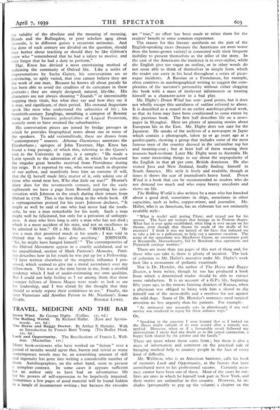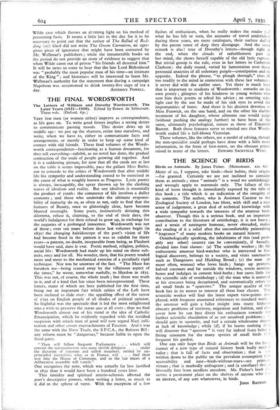TRAVEL, MEDICINE AND THE BAR
Down Wind. By George Digby. (Collins. 12s. 6d.) The Horse and Buggy Doctor. By Arthur E. Hertzler. With an Introduction by Francis Brett Young. (The Bodley Head.
12S. 6d.) MOST book-reviewers who have worked on " fiction " over a period of months would agree that, barren and trivial as many contemporary novels may be, an astonishing amount of skill and ingenuity has gone into writing a considerable number of them. Autobiographies, on the other hand, seem to present a complete contrast. In some cases it appears sufficient for an author only to have had an adventurous life for his powers of self-expression to be hopelessly impaired. Sometimes a few pages of good material will be found hidden
in a jungle of incompetent writing ; but because the episodes
are " true," no effort has been made to relate them for the readers' benefit to some common experience.
The reason for this literary antithesis on the part of the English-speaking races (because the Americans are even worse than the home-grown variety) is connected with their frequent inability to present themselves as the teller of the story. In the case of the Americans the tendency is to over-stylise, while the English give too vague an outline, or in other words do not seem able to think of themselves in simple form which the reader can carry in his head throughout a series of picar- esque incidents. A Russian or a Frenchman, for example, often contrives in autobiographical writing to suggest the com- plexities of the narrator's personality without either clogging the book with a mass of irrelevant information or treating himself as a character-actor in a bad play.
Mr. Digby's Down Wind has som- good points, but it does not wholly escape this untidiness of outline referred to above. It is described as a sequel to an earlier autobiographical work, so that its form may have been conditioned to some extent by this previous book. The first half describes life on a news- paper in Shanghai. Here are plenty of amusing stories about European life in the East. Mr. Digby does not care for the Japanese. He speaks of the archives of a newspaper in Japan which contain a photograph, taken 3o or 4o years ago at a garden-party, showing a group that includes some of the most famous men of the country dressed in the unfamiliar top hat and morning-coat ; but at least half of them wearing their trousers back-to-front. Later Mr. Digby went to Australia. He has some interesting things to say about the unpopularity of the English in that 98 per cent. British dominion. He also visited Java and New Zealand, finally finding himself in South America. His style is lively and readable, though at
times it shows the scar of journalism's heavy hand. Down Wind is a book that can be recommended to readers who do not demand too much and who enjoy breezy anecdotes and
views on life.
The Rolling World is also written by a man who has knocked about a good deal, sometimes in ships, sometimes in other capacities, such as hobo, copper-miner, and journalist. Mr. Hallet, who is an American, has an elaborate but not eminently
readable style :
" What is truth? said jesting Pilate; and stayed not for his answer. The facts are traitors that besiege us in Protean shapes. What fact is ever quite established, what king is ever secure on his throne, even though that throne be made of the skulls of his enemies? I think it was my hatred of the facts that induced me to take a job as a policeman, to help out a summer vacation. The scene of my operations was Mayflower Grove, an amusement park at Bryantville, Massachusetts, fed by Brockton shoe operatives and Plymouth cordage workers."
There are more than 30o pages of this sort of thing and, for those who can take it, there is plenty of incident. The lack of cohesion in Mr. Hallet's narrative make Mr. Digby's work look like a monument of pedantic exactitude.
Nor is Dr. Hertzler, the author of The Horse and Buggy Doctor, a born writer, though he too has produced a book from which a determined reader should be able to extract some satisfaction. It is an account of a G.P.s life, beginning fifty years ago, in the remote farming districts of Kansas, when a physician was obliged to bring with him a shovel to dig himself out of the snow-drifts and a revolver for use against the wild dogs. Some of Dr. Hertzler's sentences need surgical attention no less urgently than his patients. For example :
" As intimated one naturally asks in afterthought if any real service was rendered to repay for these arduous trips."
Or,
" Speaking in the concrete I soon learned that as I looked on the illness might subside of its own accord after a remedy was applied. However, when or if a favourable result followed my ministrations I never had any doubt as to the causal connection, a happy faith shared by the patient and the family."
There are more where those came from ; but there is also a mass of information and comment on the practical side of bringing medical help to country people in the face of every kind of difficulty.
Mr. Wellman, who is an American barrister, calls his book of memoirs Luck and Opportunity, as the factors that have contributed most to his professional success. Certainly accu- racy cannot have been one of these. Most of the cases he out- lines are ones in which he himself took part in New York, and their stories are unfamiliar in this country. However, he in- cludes (presumably to pep up the volume) a chapter on the
Wilde case which throws an alerming light on his method of presenting facts. It seems a little late in the day for it to be necessary to point out that the author of The Ballad of Red- ding (sic) Gaol did not write The Green Carnation, an egre- gious piece of ignorance that might have been corrected by Mr. Wellman's publishers ; while the innumerable books on the period do not provide an atom of evidence to suggest that when Wilde came out of prison " his friends all deserted him." It will be news to some to hear that the late Lord Birkenhead was " probably the most popular man of his time—an intimate of the King " ; and historians will be interested to learn Mr. Wellman's authority for the statement that during a campaign Napoleon was accustomed to drink twenty-five cups of tea a











































 Previous page
Previous page